Ever wondered why we laugh at dreams? We’ve all had those bizarre nighttime adventures where we’re flying, falling, or showing up to work in our underwear. These strange mental movies provide the perfect material for humor that resonates with everyone.
Dreams and jokes share a surprising connection – both twist reality in unexpected ways. When we joke about dreams, we’re celebrating the absurdity of our subconscious minds. From dreaming about being chased by a giant cupcake to suddenly speaking fluent Klingon, these nightly adventures deserve to be shared and laughed about.
Join us as we explore the funniest dream jokes that’ll have you nodding in recognition and laughing out loud. Whether you’re a vivid dreamer or barely remember yours, these jokes will make you appreciate the comedy playing in our heads while we sleep.
10 Hilarious Jokes on Dreams That Will Make You Laugh in Your Sleep
- The Job Interview Dream
Why did the man bring a ladder to his job interview in his dream? He was told the position was at a higher level! Dreams about career anxiety take on a whole new meaning when your subconscious throws in some workplace humor.
- The Flying Dilemma
What’s the biggest problem with flying in your dreams? The dream TSA still makes you take off your shoes! Flying dreams might represent freedom, but apparently not freedom from airport security protocols.
- The Recurring Dream
My friend has a recurring dream where he’s being chased by vegetables. The doctor says he’s suffering from running in his sleep… but we think it’s just his subconscious telling him to eat healthier! Recurring dreams often reveal our deepest fears—even if they’re just about broccoli.
- The Dream Interpreter
How many dream interpreters does it take to analyze a dream about lightbulbs? None—they’re all too busy reading into things that aren’t there! Dream analysis becomes much funnier when you realize how overanalyzed simple dream symbols can be.
- The Math Test Dream
I dreamed I was taking a math test and forgot to study. Then I woke up and realized I wasn’t in school anymore. Talk about calculating unnecessary anxiety! School-related stress dreams continue to haunt us long after graduation.
- The Public Speaking Nightmare
What did the dream therapist say to the person who kept dreaming about giving speeches in their underwear? “At least you’re dressed for success… somewhere!” Public speaking anxiety dreams rank among the most common—and most embarrassing.
- The Dream Budget
Why do I travel so much in my dreams? Because it’s the only vacation my budget allows! Dream destinations cost nothing but might leave you disappointed when you wake up to reality.
- The Time Traveler
My dream last night took place in three different time periods. I guess you could call me a sleep time traveler! Dreams don’t follow the laws of physics, making them the perfect vehicle for impossible adventures.
- The Dream Diet
The best part about eating cake in your dreams is that it’s completely calorie-free! Unfortunately, dream nutrition doesn’t count toward your daily sustenance. Dream indulgences provide guilt-free pleasure until the morning alarm ruins everything.
- The Sleep Talker
My partner told me I solved industry peace in my sleep talk last night. Shame I can’t remember any of it—we could’ve used that information! Sleep talking reveals our dream conversations, occasionally producing accidental brilliance we never remember.
When Dream Logic Meets Comedy: Understanding Dream Jokes
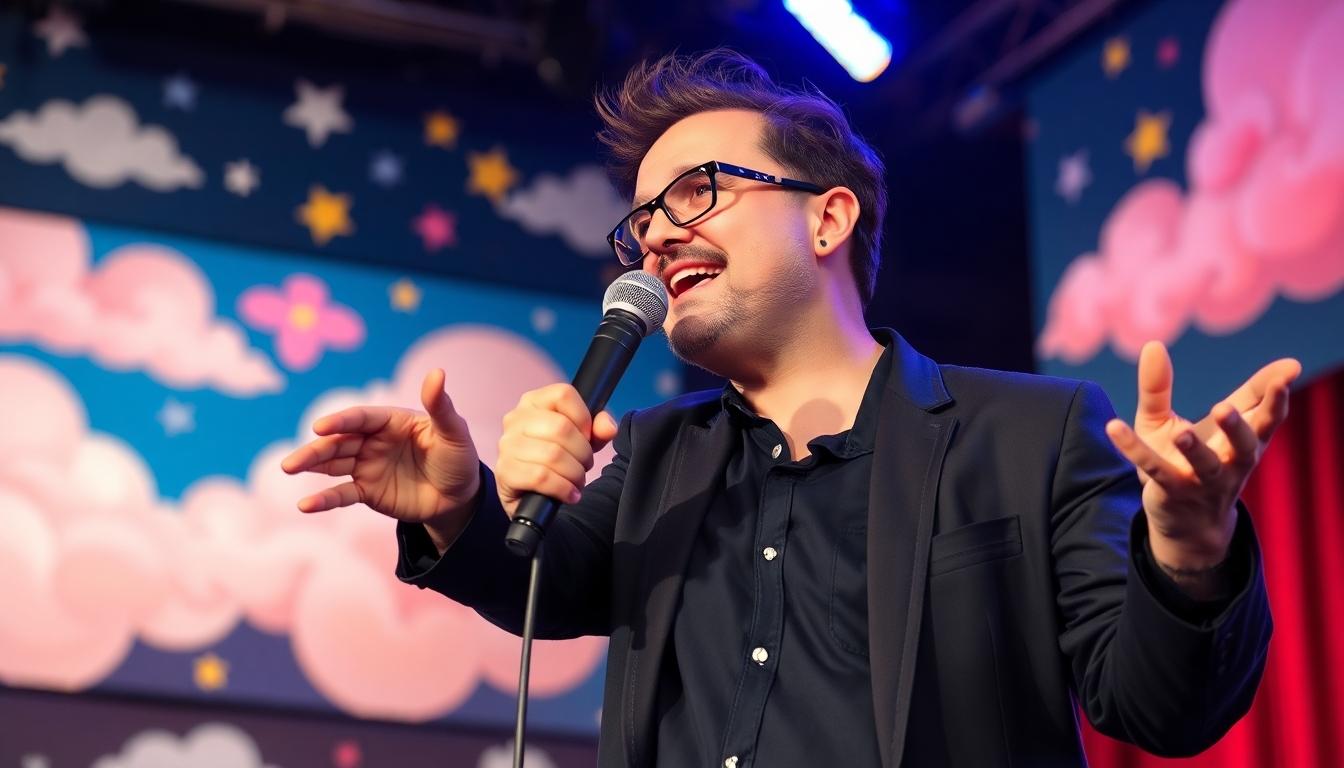
Dreams and jokes share remarkable structural similarities, making dreams an excellent model for understanding comedy. Both operate with dual layers of meaning where the surface content often masks deeper psychological elements.
Why Dreams Make Perfect Comedy Material
Dreams provide exceptional material for comedy because of their inherently illogical nature. The absurd scenarios that unfold in our dreams—flying through the sky or showing up to work without pants—create perfect setups for comedic situations. This dream-like illogic parallels the unexpected twists and turns that make jokes work so effectively. Dreams also resonate with audiences on a universal level, as everyone has experienced strange or confusing dreams. Their personal and relatable qualities make them accessible subjects that comedians can use to form immediate connections with their audience. We’ve all had those moments of waking up confused after a bizarre dream, making dream-based humor instantly recognizable and relatable.
The Psychology Behind Dream Humor
The psychological foundation of dream humor connects directly to Sigmund Freud’s theories on comedy and the unconscious mind. In his work “Wit and Its Relation to the Unconscious,” Freud explores how humor can reveal deeper psychological truths that might otherwise remain hidden. Dream jokes tap into our subconscious emotions and experiences, making them particularly captivating and authentic for audiences. Matthew Hugh Erdelyi’s interdisciplinary research further illuminates this connection in his book “The Interpretation of Dreams and of Jokes,” highlighting how both dreams and jokes contain latent content affected by context and individual differences. This fascinating overlap between cognitive psychology, neuroscience, and psychoanalysis helps explain why we find dream jokes so compelling. Dreams provide a window into our subconscious, and when comedians frame these experiences humorously, they create a safe space for us to laugh at our own psychological quirks and shared human experiences.
“I Was Flying, Then My Alarm Clock Attacked Me”: Classic Dream Scenario Jokes

The Falling Dream Punchlines
The falling dream represents one of the most universally experienced sleep phenomena, creating perfect fodder for comedy. Scientists have linked these sensations to hypnic jerks that occur during the transition between wakefulness and sleep. “I had that falling dream again last night – turns out I wasn’t falling, my cat just pushed me off the bed,” represents the classic setup-punchline structure that makes these jokes work so well. Another popular joke plays on the common experience: “My therapist says my falling dreams indicate I’m afraid of losing control. I told him I’m more afraid of hitting the ground.” Many comedians leverage the split-second terror of falling dreams, noting how we mysteriously wake up just before impact every time – “My brain has directed thousands of falling dreams and still hasn’t filmed the ending.” These jokes resonate because they transform a common nocturnal anxiety into shared laughter.
Showing Up Naked Jokes
Naked in public dreams rank among the most embarrassing yet relatable dream scenarios people experience, typically reflecting vulnerability or social anxiety according to dream researchers. “I dreamed I went to work naked yesterday. Ironically, it was the one day my boss said I was overdressed for the company culture.” This type of humor taps into deep-seated social fears while diffusing them through comedy. Another classic example plays with the unexpected: “In my dream, I showed up naked to my high school reunion. The weird part wasn’t being naked – it was that everyone recognized me immediately.” Comedians frequently mine this territory with jokes like “I had that classic naked-at-work dream again. The strangest part? My performance review improved.” The enduring popularity of these jokes stems from their ability to transform mortifying dream scenarios into communal experiences that everyone can laugh about, creating connection through shared vulnerability.
Dream Job Puns and Wordplay: Because Who Doesn’t Love a Good Dream Pun?

Career-Based Dream Wordplay
Career-based puns offer a playful way to discuss professional aspirations through the lens of dreams. Why did the career counselor suggest a dream job? Because it “slept” well with personal goals! These types of wordplay create light-hearted moments during otherwise serious career discussions. Professional ambitions often benefit from humor that combines workplace terminology with sleep-related concepts. Job seekers might appreciate hearing that their ideal position “rests” on finding the right company culture. Human resources professionals sometimes use these puns to make orientation materials more captivating and memorable. Puns utilizing multiple meanings of words provide particularly rich opportunities for dream job humor, as noted by experts studying the connection between wordplay and career satisfaction.
Sleeping Pun Opportunities
Sleeping pun opportunities abound when discussing both literal dreams and aspirational career goals. Why did the dream go to therapy? Because it was feeling a little “lost in thought”! Sleep-related wordplay creates accessible humor around topics like job fulfillment and professional exhaustion. Ambitious professionals might joke about being “caught napping” on important projects when they’re actually highly alert. Workplace discussions about burnout can be lightened with comments about needing to “dream up” better work-life balance strategies. These puns serve a dual purpose by making conversations about career aspirations more captivating while acknowledging the sometimes exhausting nature of professional development. Creative wordplay techniques like alliteration and acronyms can further enhance the humor value of sleep-related career jokes for presentations, team-building exercises, or networking events.
Celebrity Cameo Dreams: When Famous People Star in Your Nighttime Comedy
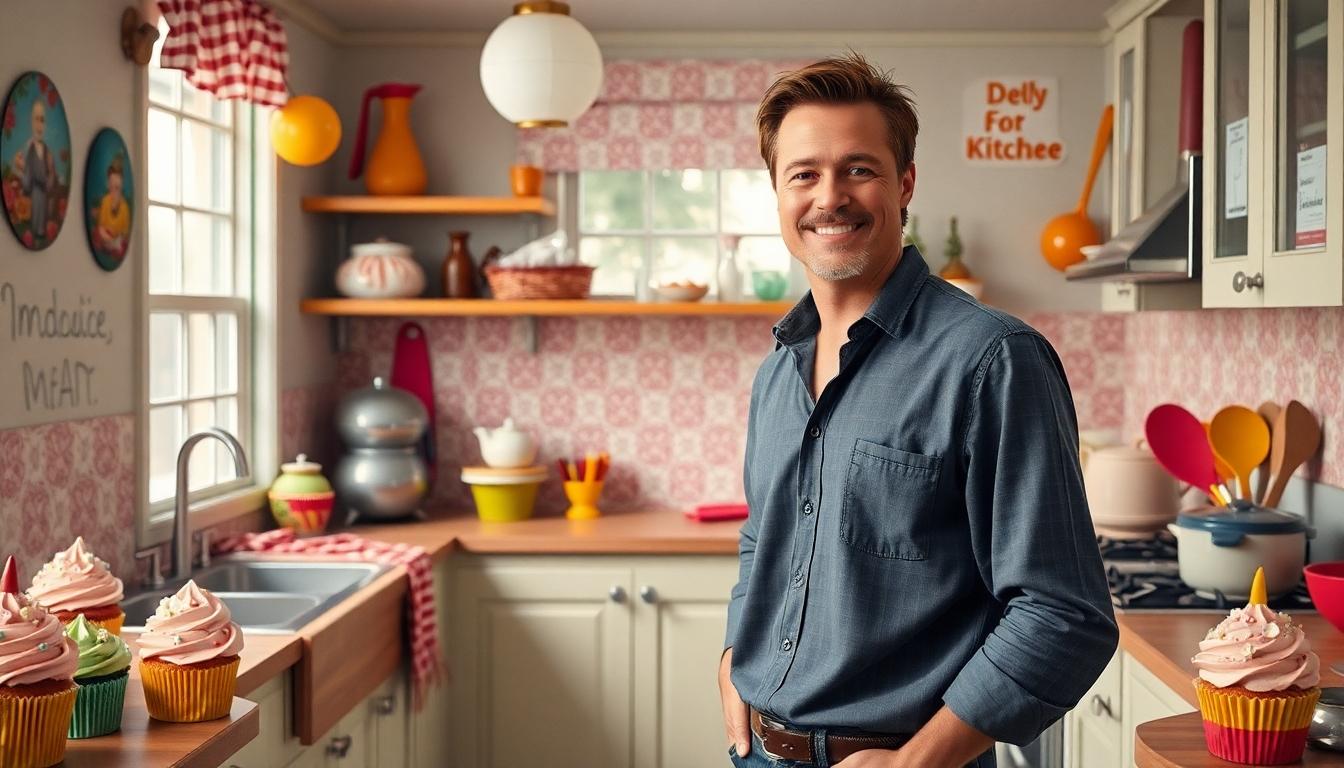
Ever wondered why Brad Pitt showed up in your kitchen or why you were suddenly best friends with Taylor Swift? Celebrity cameo dreams are among the most entertaining nighttime experiences we have. Research shows that up to 43% of REM dreams incorporate celebrity content, especially after exposure to visual media like films or TV shows before bedtime.
Why Famous Faces Appear in Our Dreams
Celebrity appearances in our dreams typically reflect our waking-life media consumption and psychological factors. The continuity hypothesis explains this phenomenon, suggesting dreams mirror our daily experiences, including the parasocial relationships we form with media figures. These one-sided bonds with celebrities create enough emotional significance for our brains to incorporate them into our dream narratives.
What These Star-Studded Dreams Really Mean
When you dream about celebrities, your subconscious might be telling you something important:
- Admiration of qualities – Your dream about meeting Dwayne “The Rock” Johnson might signal your desire for confidence or strength, qualities you associate with him.
- Self-esteem indicators – Dreams where you become a celebrity often correlate with real-life achievements or a desire for recognition in your waking life.
- Social needs – Befriending a famous person in your dream frequently reflects unmet social needs or aspirational goals you hold closely.
- Anxiety processing – That awkward dream conversation with your favorite actor might represent your brain working through social anxieties in a safe environment.
The Comedy of Celebrity Dream Encounters
The humor in celebrity dreams often comes from the absurd scenarios our minds create. While there’s limited exact research on joke-centric dreams, the comedy typically emerges from:
- Incongruity resolution – Your brain attempting to reconcile the unlikelihood of you and Jennifer Lawrence hanging out at your childhood home.
- Exaggerated interactions – Dreams often amplify celebrity traits to comical proportions, making these scenarios inherently funny when recalled.
- Role reversals – Dreams where you’re giving advice to Oprah or teaching Gordon Ramsay how to cook create natural humor through unexpected power dynamics.
Celebrity dreams serve as perfect comedy material because they combine familiar faces with impossible scenarios, creating the ideal foundation for humor. Next time a famous person crashes your dreamscape, remember it’s not just entertainment—it’s your brain processing your media consumption, social aspirations, and perhaps revealing what qualities you most admire.
Recurring Dream Jokes: The Ones That Keep Coming Back
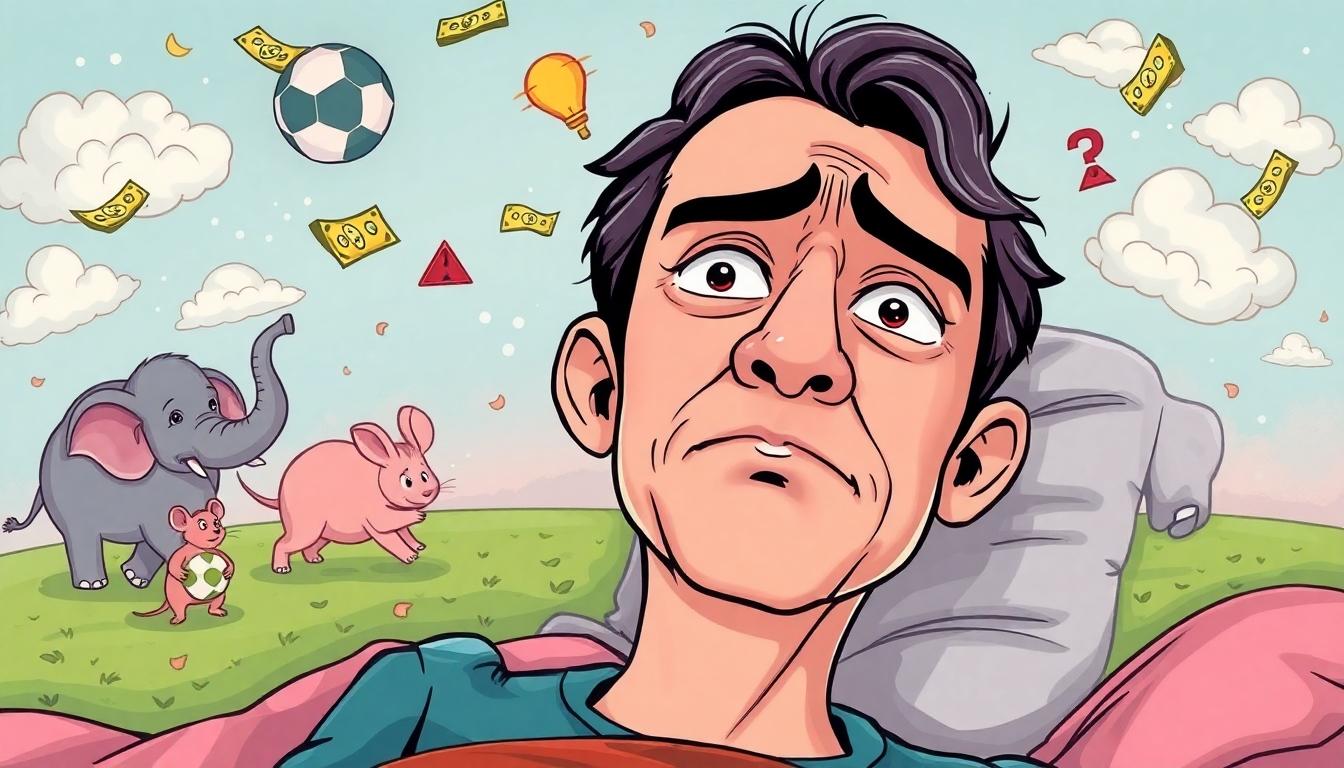
Recurring dreams provide some of the richest material for comedy, playing on our shared experiences with those stubborn nighttime scenarios that just won’t leave us alone. These jokes typically leverage the anxiety and absurdity that comes with experiencing the same dream repeatedly, creating humor that resonates deeply with audiences.
Common Recurring Dream Joke Themes
Financial Anxiety Dreams
We’ve all experienced stress about money, but recurring dream jokes take this to another level. One particularly relatable joke describes a nightmare about trying to split a $25 bill three ways, resulting in an endless decimal (8.333…) that haunts the dreamer night after night. This brilliantly captures how real-industry financial stress manifests in our subconscious.
Animal-Based Dreams
Many recurring dream jokes feature unlikely animal scenarios that defy logic. A popular example involves a person repeatedly dreaming about a soccer match between elephants and mice. The punchline comes when a doctor prescribes medicine as a “dream cure” for this irrational recurring scenario, cleverly turning the concept of medical treatment into literal dream resolution.
Professional Nightmares
Career-related recurring dreams feature prominently in humor, especially in visual formats like The Far Side comics. These jokes satirize professionals such as conductors or knights dreaming about embarrassing workplace failures. Knights showing up without armor or conductors forgetting their batons blend workplace anxiety with surreal imagery, creating instantly relatable humor.
The Structure of Recurring Dream Jokes
Recurring dream humor typically follows a consistent pattern that makes these jokes effective:
- The setup introduces a repetitive dream scenario (like unending assignments assignments)
- The punchline delivers an ironic twist or absurd logic (such as “That’s not a dream, that’s a nightmare!”)
The effectiveness of these jokes comes from merging relatability with exaggeration, often mocking universal anxieties through hyperbolic metaphors. Wordplay enhances the comedic effect, with phrases like “sleep of cake” or “hole lot of fun” amplifying the absurdity of these nighttime scenarios.
Cultural Impact
Recurring dream jokes appear across various formats in popular culture, from standalone one-liners at comedy clubs to dedicated comic strips. The Far Side cartoons have particularly excelled at visualizing these nightmares as literalized metaphors, creating immediately recognizable scenarios that translate universal anxieties into shared laughter.
Tech-Age Dream Humor: When Smartphones Invade Your Subconscious
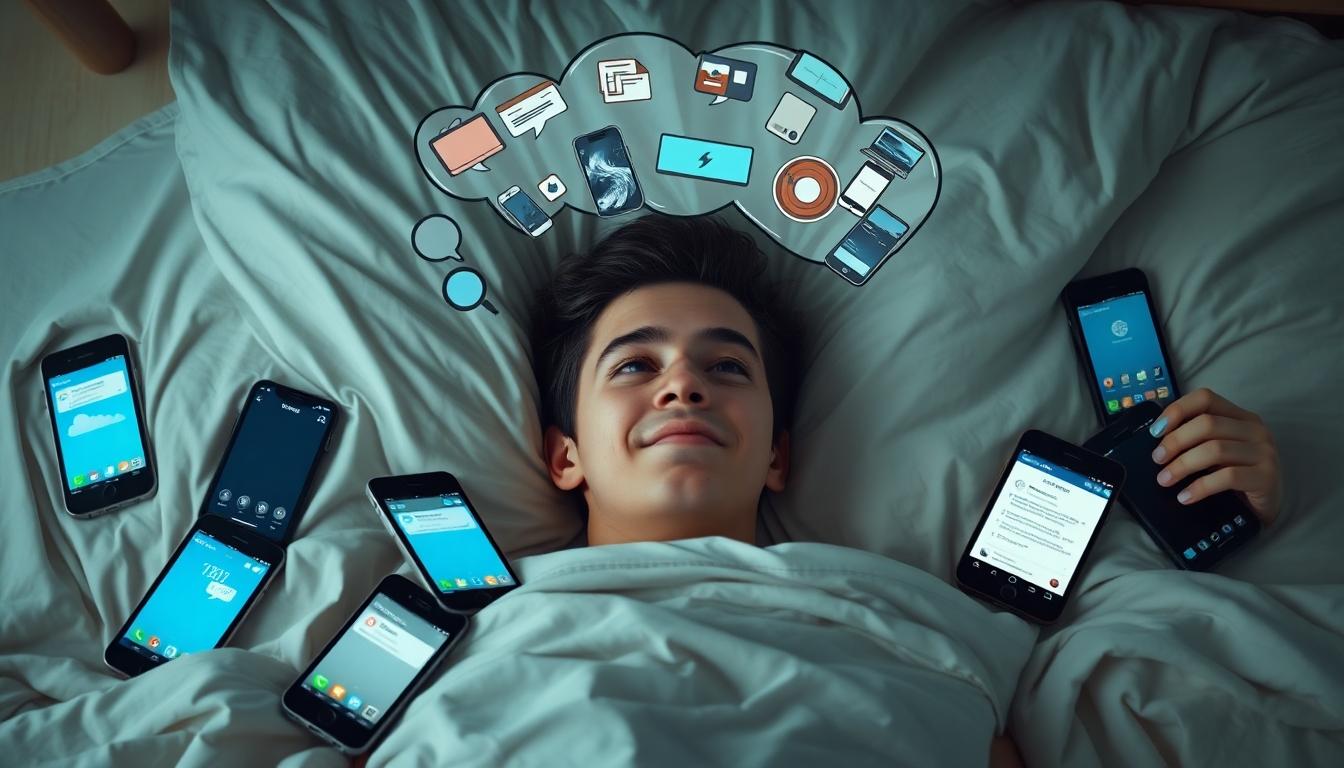
Our digital lives have become so intertwined with our subconscious that smartphones and technology now regularly feature in our dreams, creating a whole new category of dream humor. Research indicates striking cognitive parallels between humor and dreams, with both involving reinterpretation of latent content and employing similar psychological mechanisms. Smart devices have created unique dream scenarios that comedians and everyday people are turning into relatable jokes that capture our tech-dependent reality.
The Psychology Behind Tech Dreams
Technology-centric dreams often reflect digital life intrusions that manifest as phantom notifications or app-related anxiety. Studies show that humor about these phenomena employs cognitive reappraisal, similar to how dreams transform daily anxieties into symbolic narratives. Stanford experiments confirm that positive humor outperforms serious reappraisal in reducing stress, demonstrating improved verbal fluency and enhanced cognitive flexibility after humor use.
Popular Smartphone Dream Jokes
- Notification Nightmares: “I dreamt my meditation app sent me a notification saying ‘We notice you’re still awake at 3 AM—would you like to try our insomnia program?’ My subconscious now has a pop-up ad blocker.”
- Autocorrect Anxiety: “I dreamt my phone autocorrected ‘relax’ to ‘refresh’—Freud would call it a tech slip.” This joke uses brevity and incongruity to reframe latent tensions about our dependence on devices.
- Battery Life Fears: “Had a nightmare where my phone battery died during an emergency. Woke up in a cold sweat and immediately plugged in my phone—which was at 92%.”
- App Store Absurdities: “In my dream, I downloaded an app that interpreted my other dreams. It kept crashing every time I had an existential crisis.”
- Social Media Surrealism: “Why did the smartphone dream? To buffer its existential crisis.” This modern satire blends Freudian mechanisms with contemporary digital stressors.
The Therapeutic Value of Tech Dream Humor
Tech dream jokes provide valuable emotional regulation through humor. The joke structure mirrors dream mechanics, using condensation, displacement, and absurdity to process unconscious material about our relationship with technology. We find that tech-dream satire increasingly targets digital-life absurdities, helping us cope with the cognitive burdens of living in tech-saturated environments.
This intersection of humor and dreams highlights their collaborative role in mediating reality’s challenges. When we laugh about dreaming of scrolling through nonexistent social media feeds or feeling phantom phone vibrations, we’re actually processing our complex relationship with technology through the same psychological mechanisms that help us process other aspects of our lives through dreams.
Food Dreams and Midnight Snack Jokes
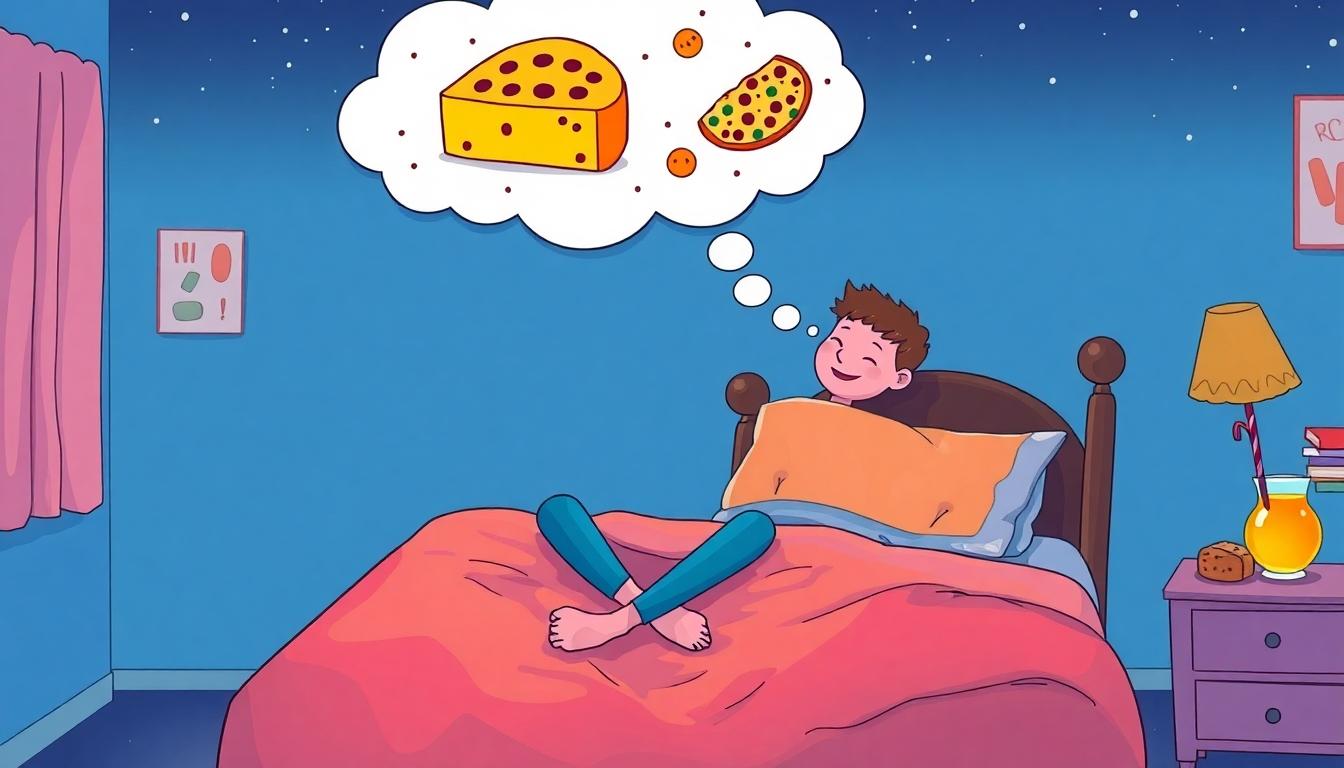
The link between food and dreams has created a delicious recipe for humor throughout popular culture. Studies reveal that 17.8% of people believe late-night eating or exact foods influence their dream experiences, according to research conducted in 2015. This perception has inspired countless jokes playing on the supposed effects of midnight snacking on our subconscious adventures.
Cheese stands out as the legendary dream-inducer, famously immortalized in the early 1900s comic strip Dreams of the Rarebit Fiend, which suggested Welsh rarebit could trigger bizarre nighttime visions. This cultural belief remains so pervasive that it inspired a popular food-themed parody of the Eurythmics hit with the lyrics “Sweet dreams are made of Cheese,” perfectly capturing our collective fascination with dairy-induced dreaming.
Some of the cheesiest food dream jokes include:
- “Why did the nightmare bring cheese to bed? To get a gouda night’s sleep!”
- “I dreamt I was swimming in an ocean of orange soda last night. It was a Fanta-sea.”
- “My pizza dream felt so real, I woke up checking for delivery receipts.”
- “I tried eating a burger before bed. Now my dreams have pickles and existential dread.”
These culinary quips tap into widespread perceptions about food affecting sleep quality and dream content. Spicy foods often feature prominently in these jokes, with many claiming they lead to particularly vivid or bizarre dreams. The scientific community acknowledges these beliefs exist across cultures, though empirical evidence supporting direct causation remains limited.
Midnight snack humor works because it combines two universal experiences—eating and dreaming—into a single comedic framework. We’ve all questioned whether that late-night taco was responsible for riding a unicorn through space in our dreams, making these jokes instantly relatable across diverse audiences.
“And Then I Woke Up”: The Perfect Punchline to Every Dream Joke
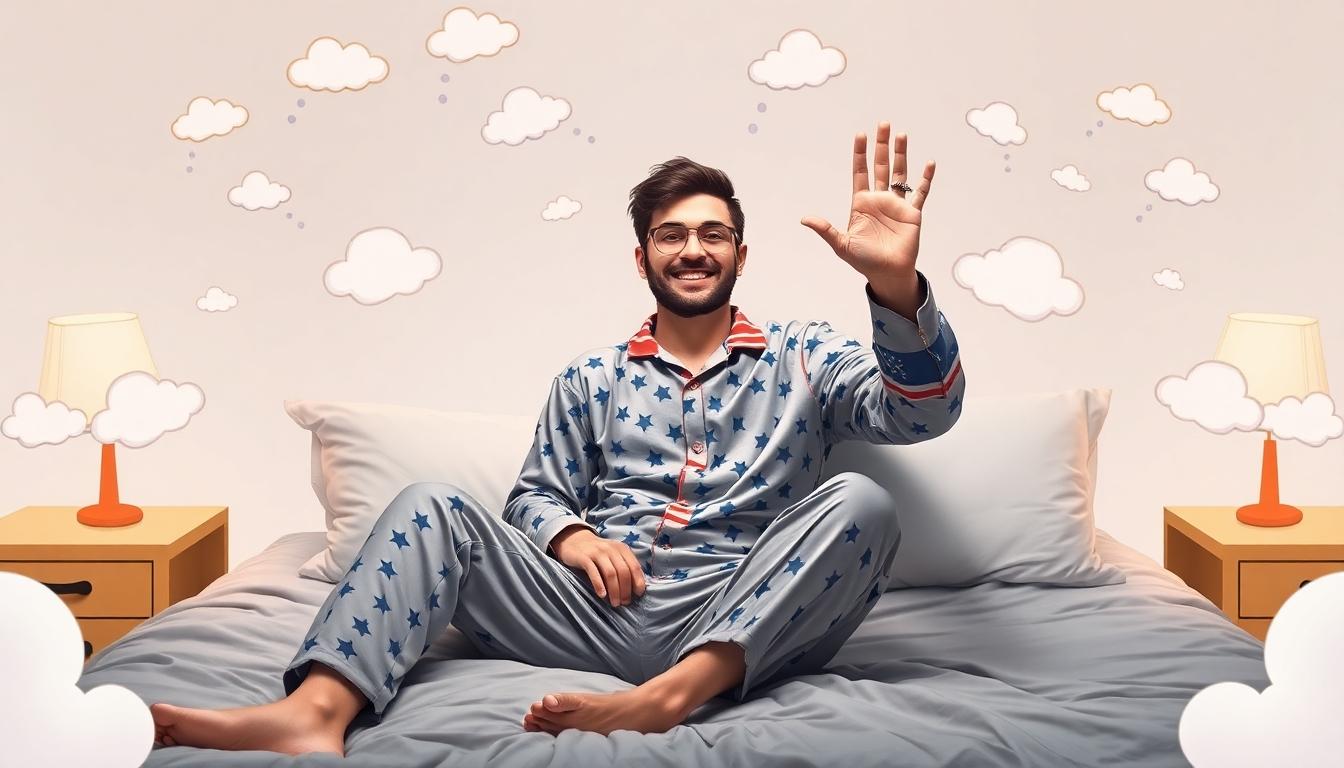
“And then I woke up” serves as the ultimate dream joke punchline, functioning as a perfect conclusion to the most absurd and unbelievable narratives. This simple phrase has become a self-referential form of humor that immediately signals to listeners that what preceded it was a dream sequence, not reality. Research shows that this punchline works effectively because it acknowledges the inherent surrealism and illogical nature of dream experiences that we all understand.
The power of this punchline lies in its ability to create an immediate release of tension. When we hear elaborate or increasingly bizarre stories culminating with “and then I woke up,” we experience what psychology researchers identify as a form of “disinhibition and underregulation” that makes dream humor both revealing and confusingly entertaining. This phenomenon represents one of the key commonalities between jokes and dreams as noted in psychological studies.
Unlike traditional jokes, dream humor often requires this distinctive closing line because dream content itself rarely provokes genuine laughter. Freud himself observed that comedic elements in dreams typically aren’t amusing in the way real jokes are, leaving both the dreamer and observers unimpressed when recounted without this framing device. The punchline transforms an otherwise mundane dream recollection into something that can be shared humorously.
Dreams and jokes share a form of disguise or encoding that requires interpretation to uncover underlying meanings. When someone delivers the “and then I woke up” line, they’re essentially giving listeners permission to decode the preceding narrative as dream content rather than an attempt at factual storytelling. This creates an interpretive framework that immediately recontextualizes everything that came before.
Comedians frequently employ this punchline to transition from seemingly serious stories to humorous reveals. The audience builds expectations throughout the narrative, only to have them completely subverted with the revelation that none of it was real. This subversion creates a cognitive shift that triggers humor through the resolution of incongruity between what was described and what actually happened.
What makes “and then I woke up” especially effective is its universal relatability. Everyone dreams, and most people have experienced the disorientation of waking from a particularly vivid or absurd dream. When used as a punchline, this phrase taps into our shared understanding of how dreams work, creating an immediate connection between the joke teller and the audience through common experience.
Sharing Dream Jokes: How to Make Others Laugh With Your Nighttime Adventures
Dreams and humor share a unique connection that transcends our conscious understanding. From flying adventures to celebrity encounters our subconscious creates the perfect setup for laughter when we’re awake.
Next time you wake up from a bizarre dream don’t just dismiss it – share it with a smile. Whether it’s about falling anxiety showing up naked in public or midnight snack-induced scenarios your dream experiences can become your best comedy material.
Remember the golden rule of dream humor: the absurdity is universal. We all visit these strange mental landscapes each night which makes dream jokes instantly relatable. So embrace your nighttime adventures and let them brighten someone’s day with laughter. After all the best response to life’s absurdities – even in sleep – is a good hearty laugh.
Frequently Asked Questions
Why do dreams make good material for jokes?
Dreams make excellent comedy material because they’re inherently absurd and illogical, just like good jokes. Both dreams and humor operate with dual layers of meaning and unexpected twists. The bizarre scenarios we experience in dreams—like flying or showing up to work naked—create perfect setups for humor that people find relatable. This shared experience of dream absurdity allows comedians to connect with audiences through common psychological quirks.
What are the most common dream scenarios used in jokes?
The most frequently joked-about dream scenarios include falling dreams (linked to hypnic jerks), appearing naked in public, being unprepared for exams or presentations, flying or floating, being chased, and having celebrity encounters. Career anxiety dreams and technology-related dreams are also popular sources of humor. These scenarios work well in jokes because they tap into universal experiences and anxieties that most people can relate to.
Do celebrities really appear in our dreams often?
Yes, approximately 43% of REM dreams incorporate celebrity content, typically influenced by recent media exposure. These celebrity cameo dreams reflect our waking-life experiences and the parasocial relationships we form with media figures. The humor in these dreams comes from absurd scenarios, unexpected interactions, and role reversals. Dreams featuring celebrities can indicate admiration for certain qualities, reflect self-esteem, represent unmet social needs, or help process anxiety.
Can food really affect our dreams?
Many people believe late-night eating influences dream experiences, which has spawned numerous food-related dream jokes. While scientific evidence varies, cultural beliefs like cheese causing vivid dreams persist in popular humor. Food dream jokes play on the idea that what we eat before bed shapes our subconscious adventures. These jokes resonate because they combine two universal experiences—eating and dreaming—creating relatable humor that connects with wide audiences.
Why is “And then I woke up” such a common punchline for dream jokes?
“And then I woke up” functions as the ultimate resolution to dream jokes, effectively transforming absurd narratives into humorous revelations. This punchline acknowledges the surreal nature of dreams and creates a shared understanding among audiences. It delivers a cognitive shift that triggers humor through the resolution of incongruity—we suddenly understand that the strange scenario was just a dream. This simple phrase efficiently concludes dream stories with a relatable punchline.
How has technology influenced dream humor?
Technology has created an entirely new category of dream humor reflecting our digital lives. Smartphones and digital devices frequently invade our subconscious, creating unique dream scenarios like phantom notifications, endless scrolling, or app-related anxieties. These tech-centric dreams have become rich material for comedians as they capture the absurdities of our tech-dependent reality. Technology dream jokes help us process our complex relationship with digital devices through shared laughter.
What makes recurring dream jokes so effective?
Recurring dream jokes provide rich comedy material by playing on shared experiences with stubborn nighttime scenarios. They typically involve a setup introducing a repetitive dream followed by an ironic twist or absurd logic. These jokes resonate deeply with audiences because they capture common themes like financial anxiety, animal encounters, or professional nightmares. Their effectiveness comes from transforming personal, often anxiety-inducing experiences into communal humor that fosters connection.
How did Sigmund Freud connect dreams and humor?
Freud theorized that both dreams and humor reveal deeper psychological truths from our unconscious mind. He suggested that jokes, like dreams, allow repressed thoughts to surface in disguised, socially acceptable forms. By framing dream experiences humorously, comedians create relatable connections with audiences, enabling people to laugh at their own psychological quirks. This shared recognition of common anxieties and desires through humor creates a sense of connection through our universal dream experiences.







